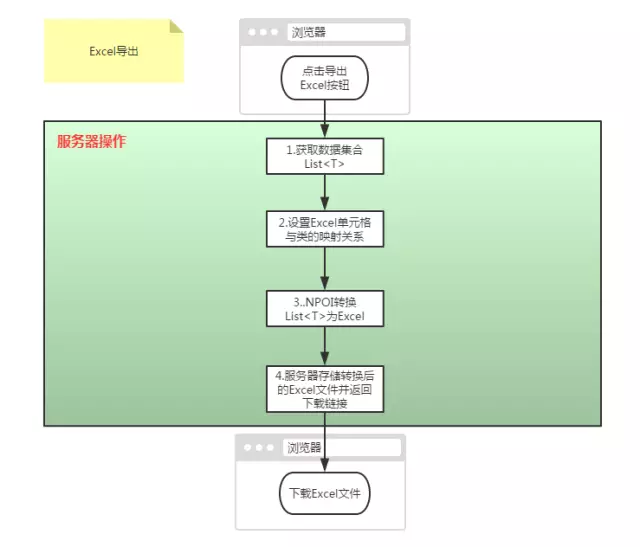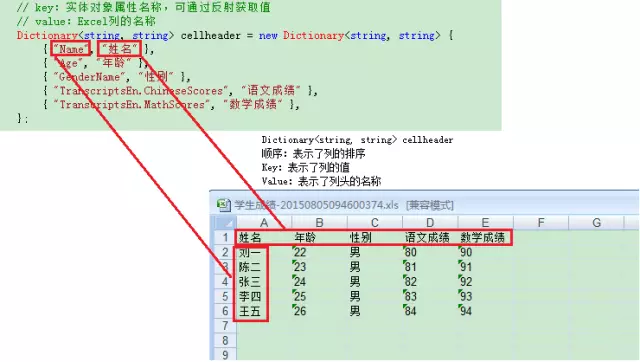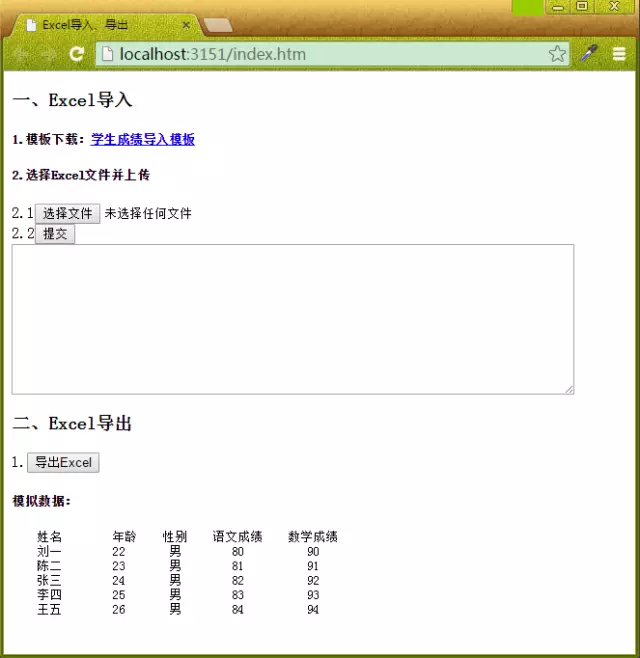Home >Backend Development >C#.Net Tutorial >C# programming Excel import and export (source code download) (Part 2)
C# programming Excel import and export (source code download) (Part 2)
- 黄舟Original
- 2017-02-06 16:55:571928browse
3. Excel导出
3.1 导出流程

3.2 NPOI操作代码
说明:把List
步骤:
①创建一个工作簿(Workbook);
②在工作簿上创建一个工作表(Sheet);
③在工作表上创建第一行(row),第一行为列头,依次写入cellHeard的值(做为列名)。
④循环遍历List
代码:
/// <summary>
/// 实体类集合导出到Excle2003
/// </summary>
/// <param name="cellHeard">单元头的Key和Value:{ { "UserName", "姓名" }, { "Age", "年龄" } };</param>
/// <param name="enList">数据源</param>
/// <param name="sheetName">工作表名称</param>
/// <returns>文件的下载地址</returns>
public static string EntityListToExcel2003(Dictionary<string, string> cellHeard, IList enList, string sheetName)
{
try
{
string fileName = sheetName + "-" + DateTime.Now.ToString("yyyyMMddHHmmssfff") + ".xls"; // 文件名称
string urlPath = "UpFiles/ExcelFiles/" + fileName; // 文件下载的URL地址,供给前台下载
string filePath = HttpContext.Current.Server.MapPath("\\" + urlPath); // 文件路径
// 1.检测是否存在文件夹,若不存在就建立个文件夹
string directoryName = Path.GetDirectoryName(filePath);
if (!Directory.Exists(directoryName))
{
Directory.CreateDirectory(directoryName);
}
// 2.解析单元格头部,设置单元头的中文名称
HSSFWorkbook workbook = new HSSFWorkbook(); // 工作簿
ISheet sheet = workbook.CreateSheet(sheetName); // 工作表
IRow row = sheet.CreateRow(0);
List<string> keys = cellHeard.Keys.ToList();
for (int i = 0; i < keys.Count; i++)
{
row.CreateCell(i).SetCellValue(cellHeard[keys[i]]); // 列名为Key的值
}
// 3.List对象的值赋值到Excel的单元格里
int rowIndex = 1; // 从第二行开始赋值(第一行已设置为单元头)
foreach (var en in enList)
{
IRow rowTmp = sheet.CreateRow(rowIndex);
for (int i = 0; i < keys.Count; i++) // 根据指定的属性名称,获取对象指定属性的值
{
string cellValue = ""; // 单元格的值
object properotyValue = null; // 属性的值
System.Reflection.PropertyInfo properotyInfo = null; // 属性的信息
// 3.1 若属性头的名称包含'.',就表示是子类里的属性,那么就要遍历子类,eg:UserEn.UserName
if (keys[i].IndexOf(".") >= 0)
{
// 3.1.1 解析子类属性(这里只解析1层子类,多层子类未处理)
string[] properotyArray = keys[i].Split(new string[] { "." }, StringSplitOptions.RemoveEmptyEntries);
string subClassName = properotyArray[0]; // '.'前面的为子类的名称
string subClassProperotyName = properotyArray[1]; // '.'后面的为子类的属性名称
System.Reflection.PropertyInfo subClassInfo = en.GetType().GetProperty(subClassName); // 获取子类的类型
if (subClassInfo != null)
{
// 3.1.2 获取子类的实例
var subClassEn = en.GetType().GetProperty(subClassName).GetValue(en, null);
// 3.1.3 根据属性名称获取子类里的属性类型
properotyInfo = subClassInfo.PropertyType.GetProperty(subClassProperotyName);
if (properotyInfo != null)
{
properotyValue = properotyInfo.GetValue(subClassEn, null); // 获取子类属性的值
}
}
}
else
{
// 3.2 若不是子类的属性,直接根据属性名称获取对象对应的属性
properotyInfo = en.GetType().GetProperty(keys[i]);
if (properotyInfo != null)
{
properotyValue = properotyInfo.GetValue(en, null);
}
}
// 3.3 属性值经过转换赋值给单元格值
if (properotyValue != null)
{
cellValue = properotyValue.ToString();
// 3.3.1 对时间初始值赋值为空
if (cellValue.Trim() == "0001/1/1 0:00:00" || cellValue.Trim() == "0001/1/1 23:59:59")
{
cellValue = "";
}
}
// 3.4 填充到Excel的单元格里
rowTmp.CreateCell(i).SetCellValue(cellValue);
}
rowIndex++;
}
// 4.生成文件
FileStream file = new FileStream(filePath, FileMode.Create);
workbook.Write(file);
file.Close();
// 5.返回下载路径
return urlPath;
}
catch (Exception ex)
{
throw ex;
}
}3.3 C#逻辑操作代码
说明:对Excel转换后的List
步骤:
①获取List
②调用3.2,将List
③服务器存储Excel文件并返回下载链接。
代码:
public void ExportExcel(HttpContext context)
{
try
{
// 1.获取数据集合
List<UserEntity> enlist = new List<UserEntity>() {
new UserEntity{Name="刘一",Age=22,Gender="Male",TranscriptsEn=new TranscriptsEntity{ChineseScores=80,MathScores=90}},
new UserEntity{Name="陈二",Age=23,Gender="Male",TranscriptsEn=new TranscriptsEntity{ChineseScores=81,MathScores=91} },
new UserEntity{Name="张三",Age=24,Gender="Male",TranscriptsEn=new TranscriptsEntity{ChineseScores=82,MathScores=92} },
new UserEntity{Name="李四",Age=25,Gender="Male",TranscriptsEn=new TranscriptsEntity{ChineseScores=83,MathScores=93} },
new UserEntity{Name="王五",Age=26,Gender="Male",TranscriptsEn=new TranscriptsEntity{ChineseScores=84,MathScores=94} },
};
// 2.设置单元格抬头
// key:实体对象属性名称,可通过反射获取值
// value:Excel列的名称
Dictionary<string, string> cellheader = new Dictionary<string, string> {
{ "Name", "姓名" },
{ "Age", "年龄" },
{ "GenderName", "性别" },
{ "TranscriptsEn.ChineseScores", "语文成绩" },
{ "TranscriptsEn.MathScores", "数学成绩" },
};
// 3.进行Excel转换操作,并返回转换的文件下载链接
string urlPath = ExcelHelper.EntityListToExcel2003(cellheader, enlist, "学生成绩");
System.Web.Script.Serialization.JavaScriptSerializer js = new System.Web.Script.Serialization.JavaScriptSerializer();
context.Response.ContentType = "text/plain";
context.Response.Write(js.Serialize(urlPath)); // 返回Json格式的内容
}
catch (Exception ex)
{
throw ex;
}
}3.4 代码分析
核心代码主要是cellheader与List

4. 源码下载
4.1 运行图

4.2 下载地址
百度网盘: http://pan.baidu.com/s/1o69We8M
CSDN:http://download.csdn.net/download/polk6/8974195
The above is the content of Excel import and export (source code download) for C# programming (below). For more related content, please pay attention to the PHP Chinese website (www.php.cn)!

